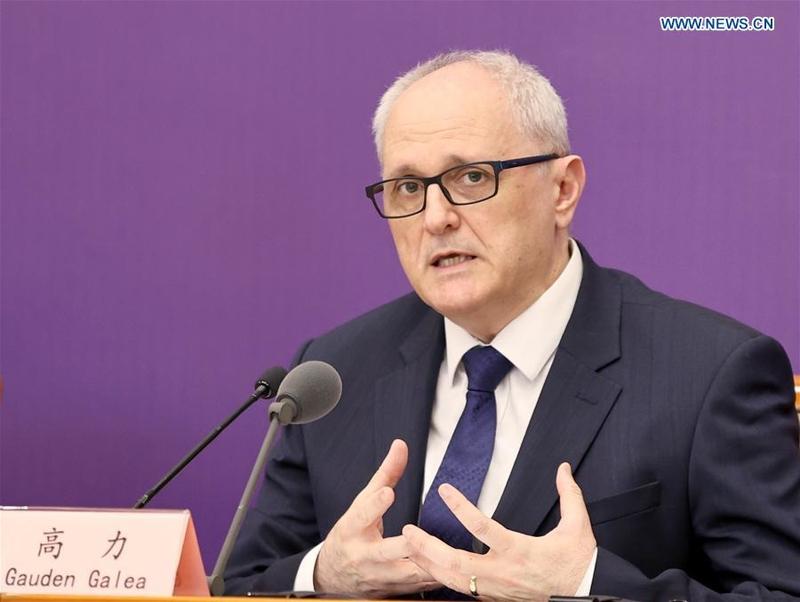 Gauden Galea, the World Health Organization (WHO)'s China representative, speaks at a press conference held by the joint prevention and control mechanism of the State Council in Beijing, capital of China, April 7, 2020. (CHEN JIANLI / XINHUA)
Gauden Galea, the World Health Organization (WHO)'s China representative, speaks at a press conference held by the joint prevention and control mechanism of the State Council in Beijing, capital of China, April 7, 2020. (CHEN JIANLI / XINHUA)
The World Health Organization's China representative said on Tuesday that China has offered "compelling" examples in mounting rigorous containment measures against the novel coronavirus and mobilizing nationwide efforts to aid hard-hit regions.
These are valuable lessons for foreign countries that are scrambling to handle a surge of patients and curtail high fatality rates as the disease continues to sweep the globe and the peak of the pandemic has not passed, Gauden Galea said at a news conference.
However, Galea also emphasized that an effective vaccine is indispensable to stamping out the contagion and consolidated efforts on vaccine development from scientists globally are essential.
The same solidarity as one needs at the country level in order to mount an effective response is also needed internationally to cooperate in the research, as the best minds around the world working together will help find a solution much faster.
Gauden Galea, WHO's China representative
Even in China, where the spread of the virus is believed to be suppressed, health authorities have maintained vigilance against any new outbreaks triggered by sporadic locally transmitted cases or imported cases involving people returning from overseas.
"The only way that we will overcome it (the virus) is when we have achieved the status that everyone has either been vaccinated by some future vaccine or achieved immunity by being exposed to the virus," he said, adding that different sectors from academics and government institutions to private companies are now racing to test promising candidates.
ALSO READ: Efficient measures key to containment
"The same solidarity as one needs at the country level in order to mount an effective response is also needed internationally to cooperate in the research, as the best minds around the world working together will help find a solution much faster," he said.
Before an effective and safe vaccine can be approved for public use, Galea said a series of traditional public health measures, such as keeping social distance, wide testing and prompt tracing of close contacts and quarantine, are at hand. These strategies have been deployed and scaled up across China and proved to be effective in curbing the epidemic, he said.
He also stressed that extensive testing and epidemiological investigations will enable health authorities to understand the risk levels and the extent of transmission in an area.
"In China, most communities are now free of the virus and the cases we are hearing of are basically imported cases," he said.
The Chinese mainland added 32 new confirmed infections on Monday-all involving people returning from overseas-bringing the total number of imported cases nationwide to 983, according to the National Health Commission.
Galea added that the digital approach adopted by the Chinese government-using smart technology to coordinate supplies and logistics of materials and to facilitate tracing close contacts of infected patients-is also being widely implemented in some foreign countries.
READ MORE: Countries told to learn from China in virus fight
Guo Yanhong, a senior official at the commission's medical administration and supervision bureau, said 38,000 of the over 42,000 medical workers sent to Hubei had returned to their home provinces by Monday.
"Nearly 1,000 medical workers and some senior experts have remained in Wuhan and Hubei. They are responsible for treating severe cases," she said.
As more countries are confronted with overburdened healthcare systems, Galea has urged collaboration between countries to boost the capacity of areas that have weak health systems and are in dire need of medical supplies.
"China gives a compelling example where different provinces twinned up with different cities in Hubei, the hardest-hit area. They have provided healthcare services-both equipment and healthcare workers-that are needed in the spirit of solidarity," he said.
For countries that cannot afford to send sufficient numbers of healthcare workers to badly affected regions, Galea said rigorous application of containment strategies to avert a sudden spike in cases is crucial.
In some provinces in China, the number of infections was kept consistently very low thanks to aggressive control measures. "That is the ideal situation for countries that can mount such strong public health measures," he said.
Zou Shuo contributed to this story.


